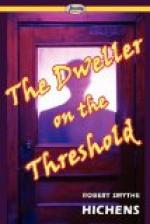“Really, clergymen are far more to be depended upon for valuable manifestations than a rat or two and a hysterical kitchen-maid. Come to my room, Malling.”
The professor had a bedroom facing the sea. He led Malling to it, shut the door, gave Malling a cane chair, sat down himself, in a peculiar, crab-like posture, upon the bed, and said:
“Now give me as minute a psychological study of the former and actual Henry Chichester as you can.”
Malling complied with this request as lucidly and tersely as he could, wasting no words.
“Any unusual change in his outward man since you knew him two years ago?” asked the professor, when he had finished.
Malling mentioned the question as to the curate’s eyes and mouth which had risen in his mind, and added:
“But the character of the man is so changed that it may have suggestioned me into feeling as if there were physical change in him, too.”
“More than would be inevitable in any man in a couple of years. And now as to his digestive organs.”
“Good heavens!” exclaimed Malling.
The apparent vagaries of his companion very seldom surprised him, but this time he was completely taken aback.
“Are they what they were? Assuming, on your part, a knowledge of what they were.”
“I don’t know either in what condition they are now, or in what condition they were once.”
“Ah! Now I must draw up a report about last night. I’ll come for that cup of tea to Minors—might almost as well have been Majors, even granting the military flavor—about five.”
Malling took his departure.
At a quarter to five he heard the click of the garden gate, and looking out at the latticed window of the hall, he saw the professor walking sidewise up the path, with a shawl round his shoulders. He went to let him in, and took him into the tiny drawing-room.
“An odd shell for Harding!” observed the professor. “More suitable to a bantam than to a Cochin-China!”
“It doesn’t belong to him.”
“Nor he to it. Very wise and right of him to go back to Onslow Gardens.”
A maid brought in the tea, and the professor, spread strangely forth in a small, chintz-covered arm-chair, enjoyed it while he talked about oysters and oyster-beds. He was deeply interested in the oysters of Whitstable, and held forth almost romantically on their birth and upbringing, the fattening, the packing, the selling, and the eating of them—“with lemon, not vinegar, mind! To eat vinegar with a Whitstable native is as vicious as to offer a libation of catchup at the altar of a meadow mushroom just picked up out of the dew.”
Malling did not attempt to turn his mind from edibles. The professor had to be let alone. When tea was finished and cleared away, he observed:
“And now, Malling, what is your view? Do you look upon it as a case of transferred personality? I rather gathered from your general tone that you were mentally drifting in that direction.”




